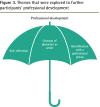Peer-support writing group in a community family medicine teaching unit: Facilitating professional development
- PMID: 27965348
- PMCID: PMC5154663
Peer-support writing group in a community family medicine teaching unit: Facilitating professional development
Abstract
Problem addressed: Aspiring physician writers need an environment that promotes self-reflection and can help them improve their skills and confidence in writing.
Objective of program: To create a peer-support writing group for physicians in the Markham-Stouffville community in Ontario to promote professional development by encouraging self-reflection and fostering the concept of physician as writer.
Program description: The program, designed based on a literature review and a needs assessment, was conducted in 3 sessions over 6 months. Participants included an emergency physician, 4 family physicians, and 3 residents. Four to 8 participants per session shared their projects with guest physician authors. Eight pieces of written work were brought to the sessions, 3 of which were edited. A mixed quantitative and qualitative evaluation model was used with preprogram and postprogram questionnaires and a focus group.
Conclusion: This program promoted professional development by increasing participants' frequency of self-reflection and improving their proficiency in writing. Successful elements of this program include creating a supportive group environment and having a physician-writer expert facilitate the peer-feedback sessions. Similar programs can be useful in postgraduate education or continuing professional development.
Problème à l’étude: Les médecins désireux d’écrire ont besoin d’un environnement qui favorise l’auto-réflexion, et qui les rend plus habiles et plus confiants en leur capacité d’écrire.
Objectif: Créer un groupe d’aide à la rédaction composé de pairs chez des médecins de la communauté Markham-Stouffville afin de promouvoir le développement professionnel en encourageant l’auto-réflexion et en insistant sur le concept de médecin-auteur.
Description du programme: Conçu à partir d’une revue de la littérature et d’une évaluation des besoins, le programme comprenait 3 sessions sur une durée de 6 mois. Les participants comprenaient un médecin des urgences, 4 médecins de famille et 3 résidents. Dans chacune des sessions, entre 4 et 8 participants discutaient de leurs suggestions de texte avec des médecins-auteurs invités. Parmi les huit textes écrits discutés durant les sessions, 3 ont été publiés. Une évaluation quantitative-qualitative de type mixte a été effectuée à l’aide de questionnaires avant et après le programme ainsi que par un groupe de discussion.
Conclusion: Le programme a favorisé le développement professionnel en augmentant la fréquence à laquelle les participants recouraient à l’auto-réflexion et en améliorant leur capacité d’écrire. Parmi les éléments les plus efficaces du programme, mentionnons la création d’un groupe local d’aide et le fait que la présence de médecins-auteurs experts facilitait les sessions de rétroaction par des pairs. De tels programmes pourraient être utilisés dans les programmes de formation de troisième cycle ou dans la formation médicale continue.
Copyright© the College of Family Physicians of Canada.
Figures
References
MeSH terms
LinkOut - more resources
Full Text Sources
Research Materials



